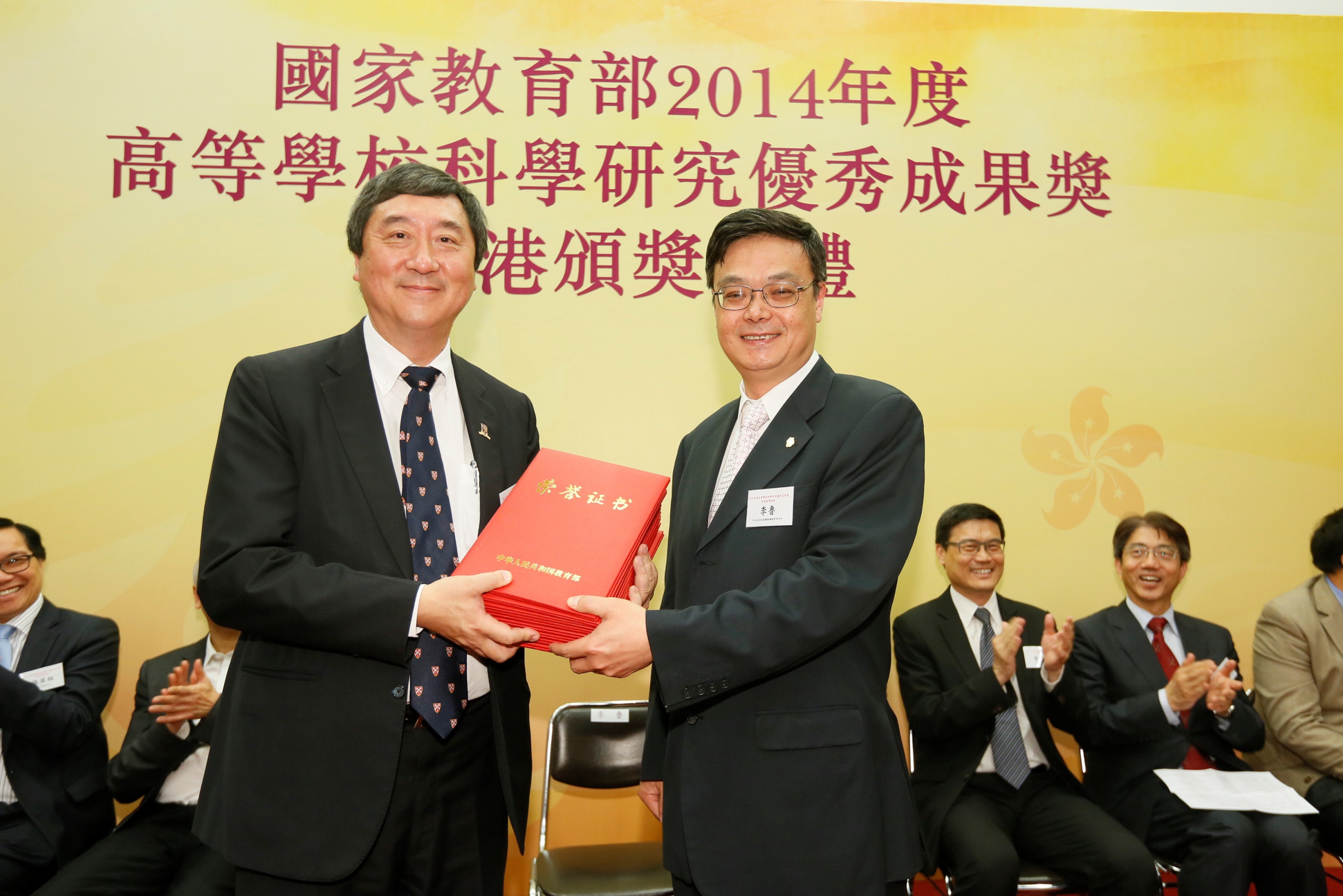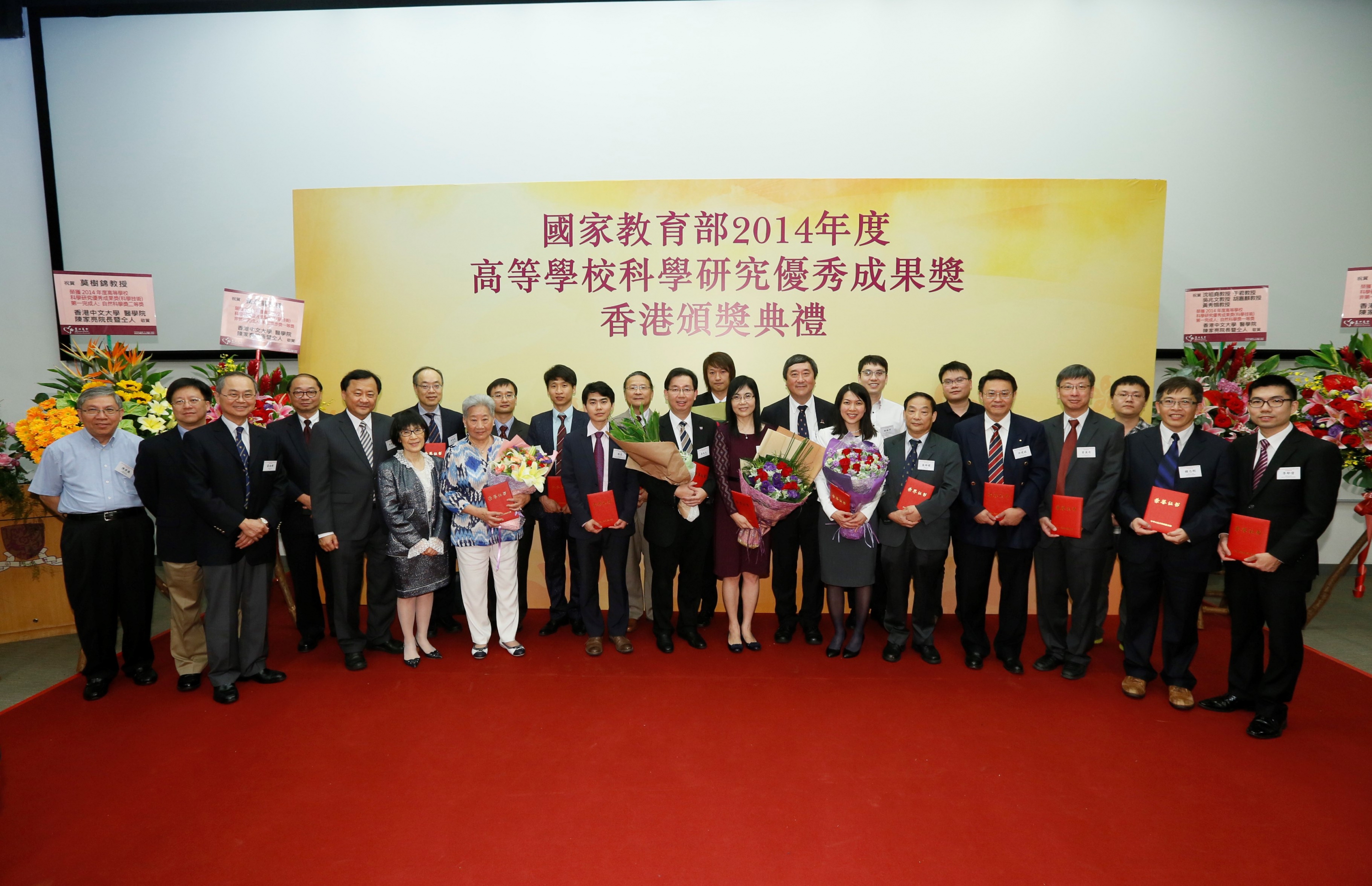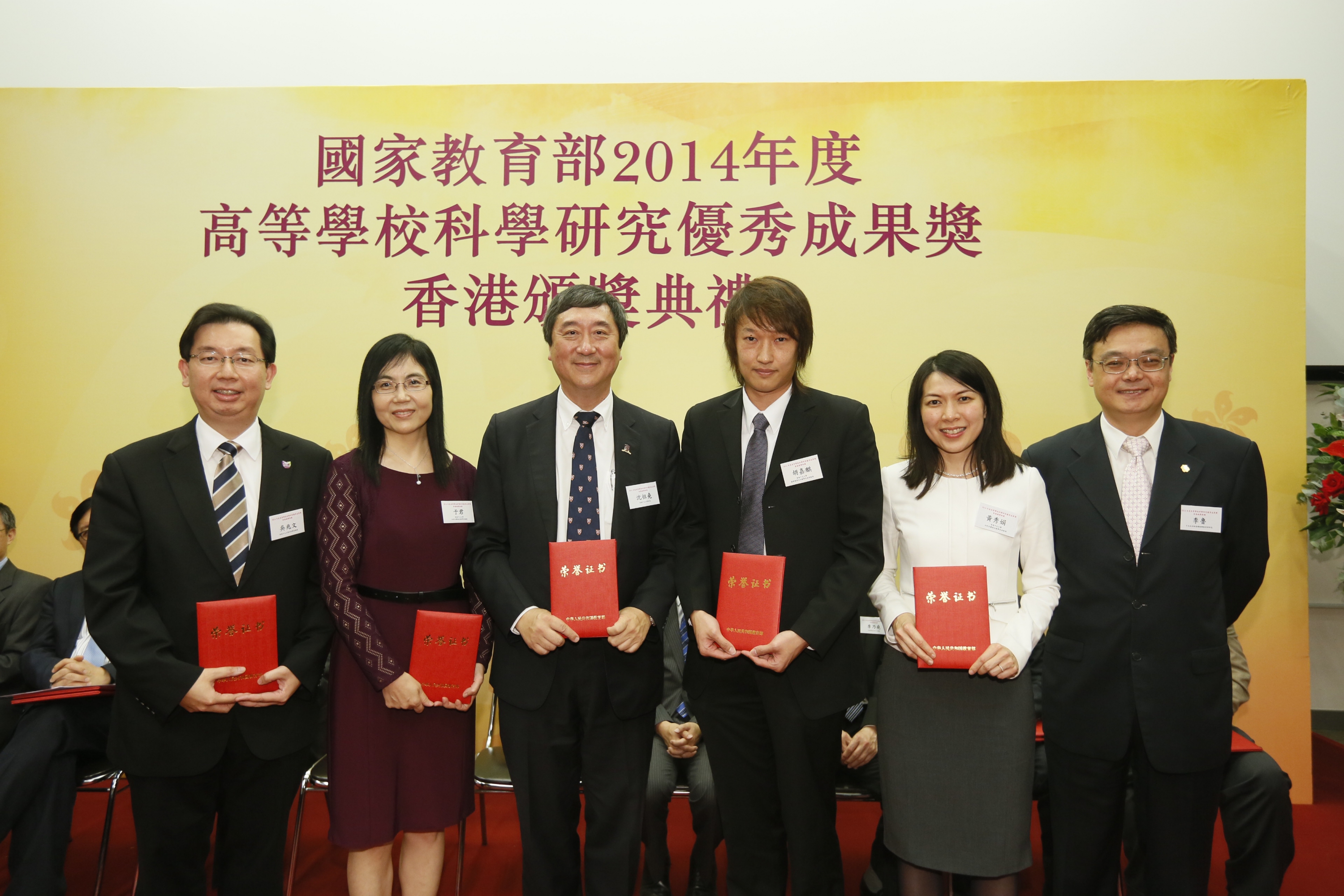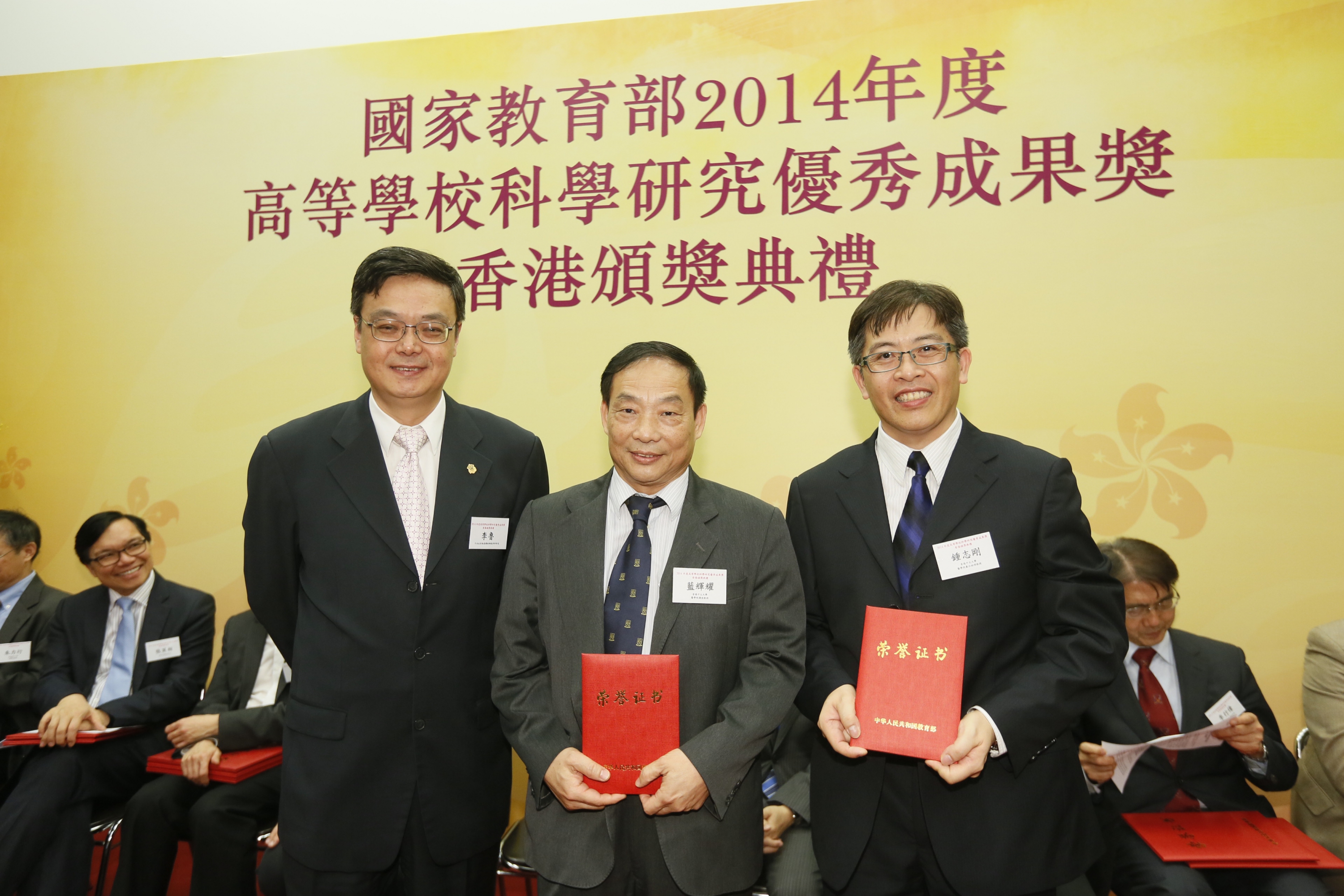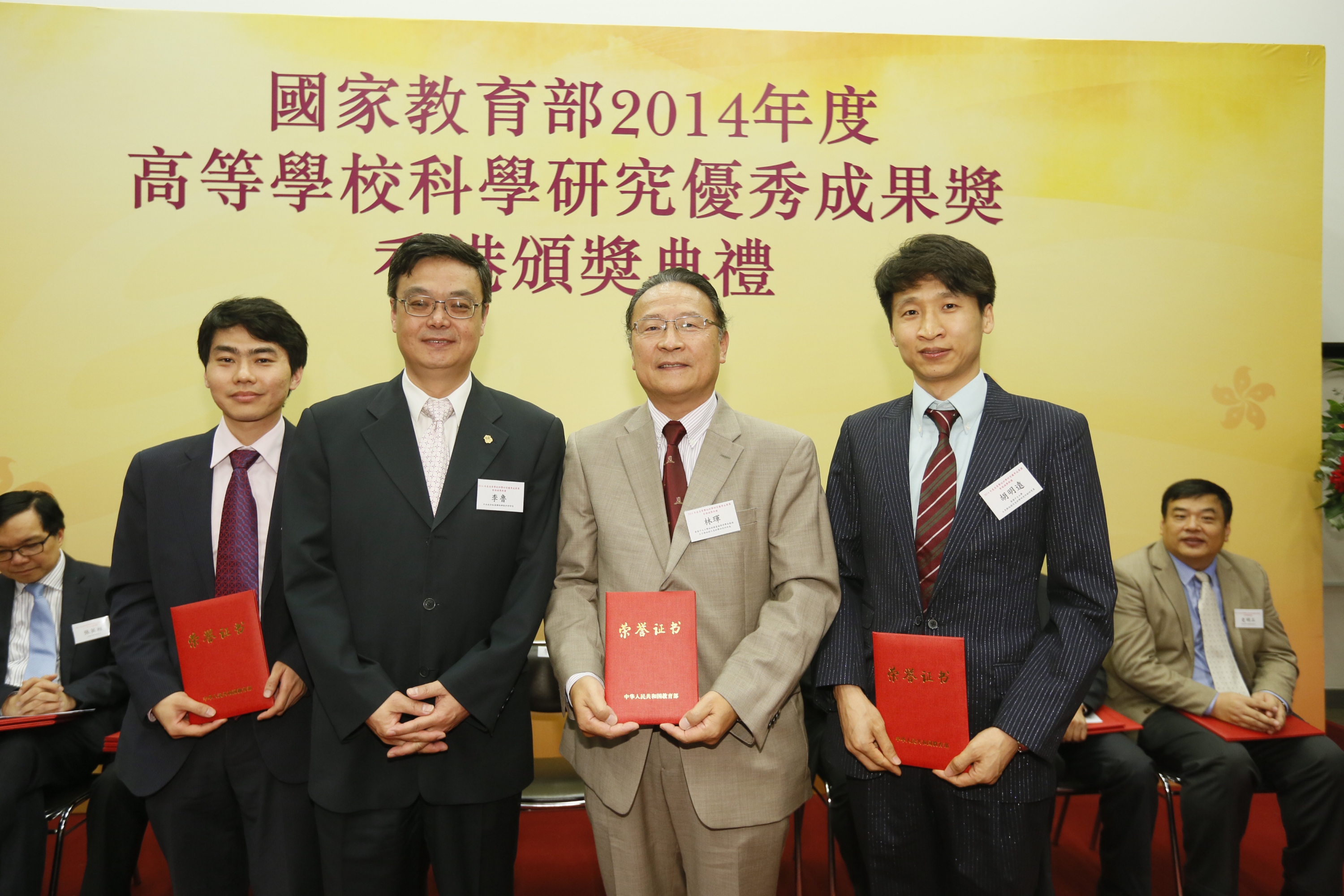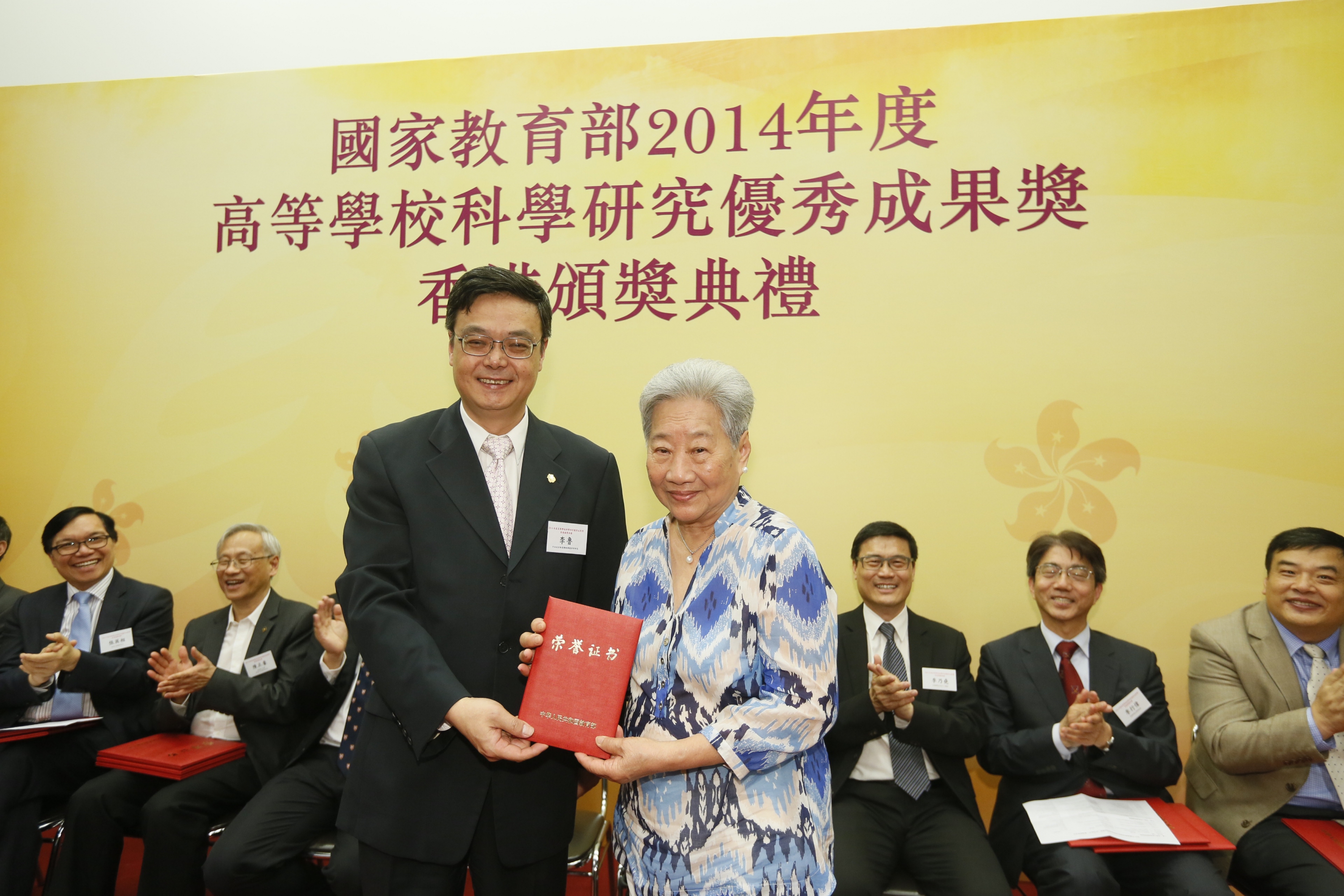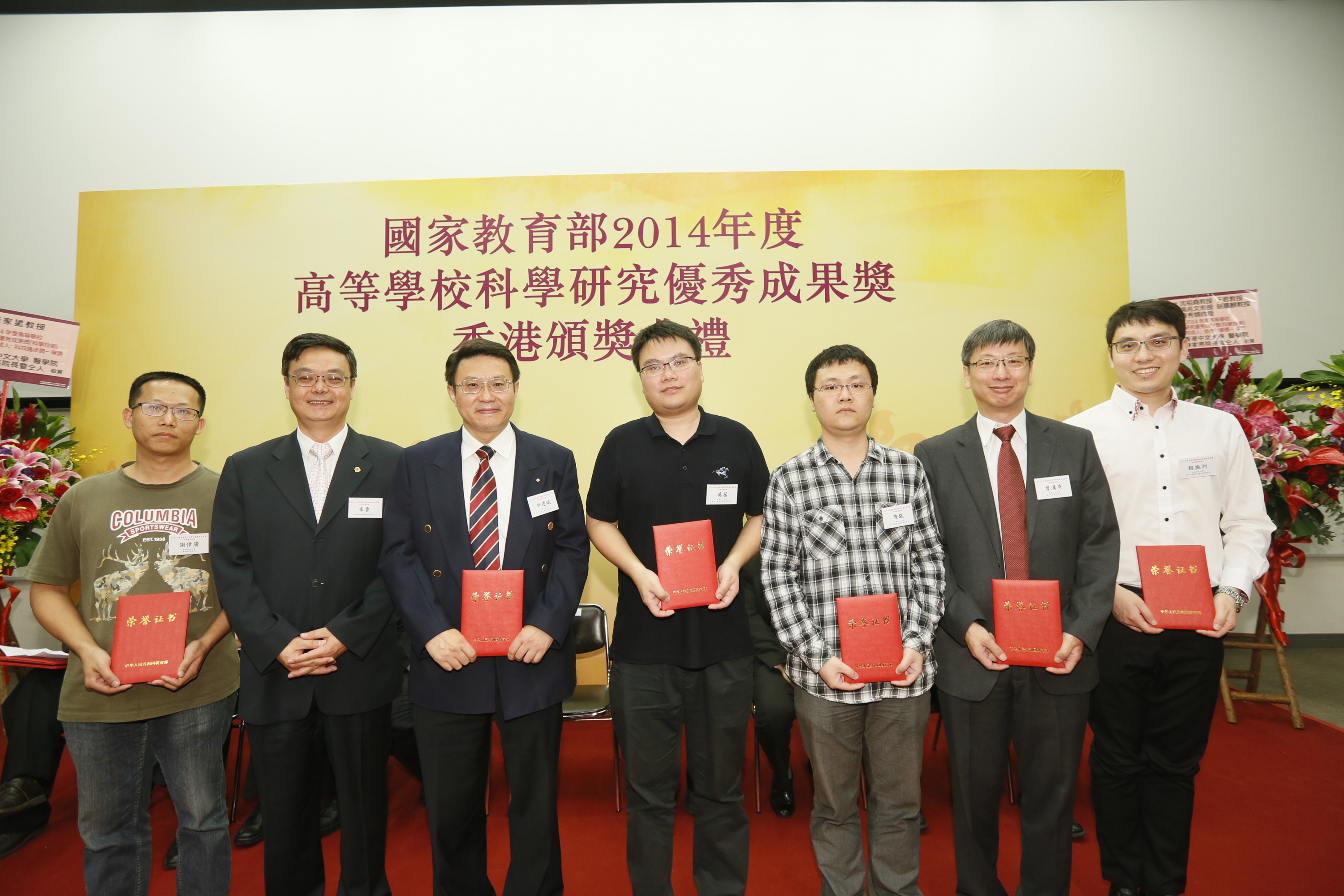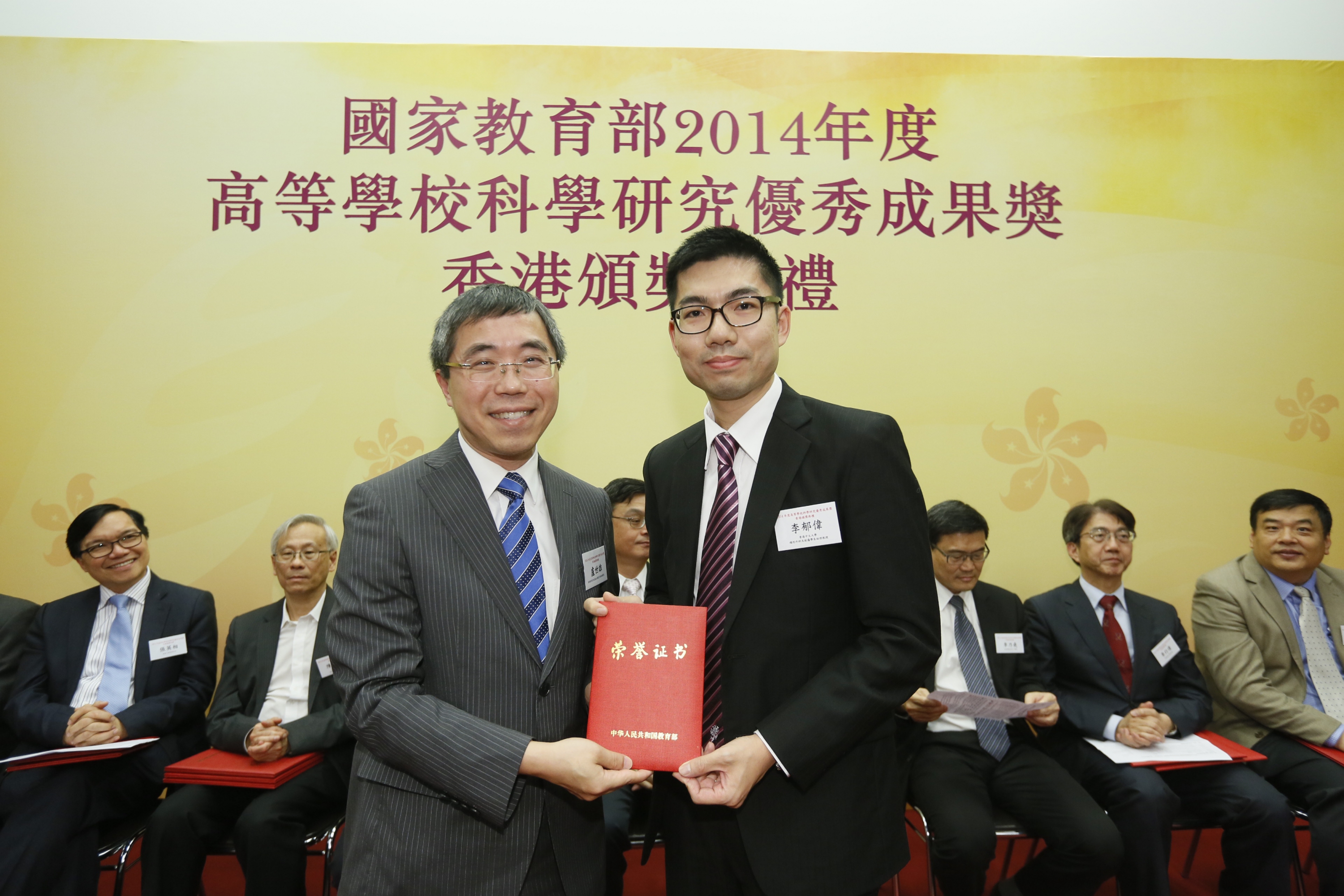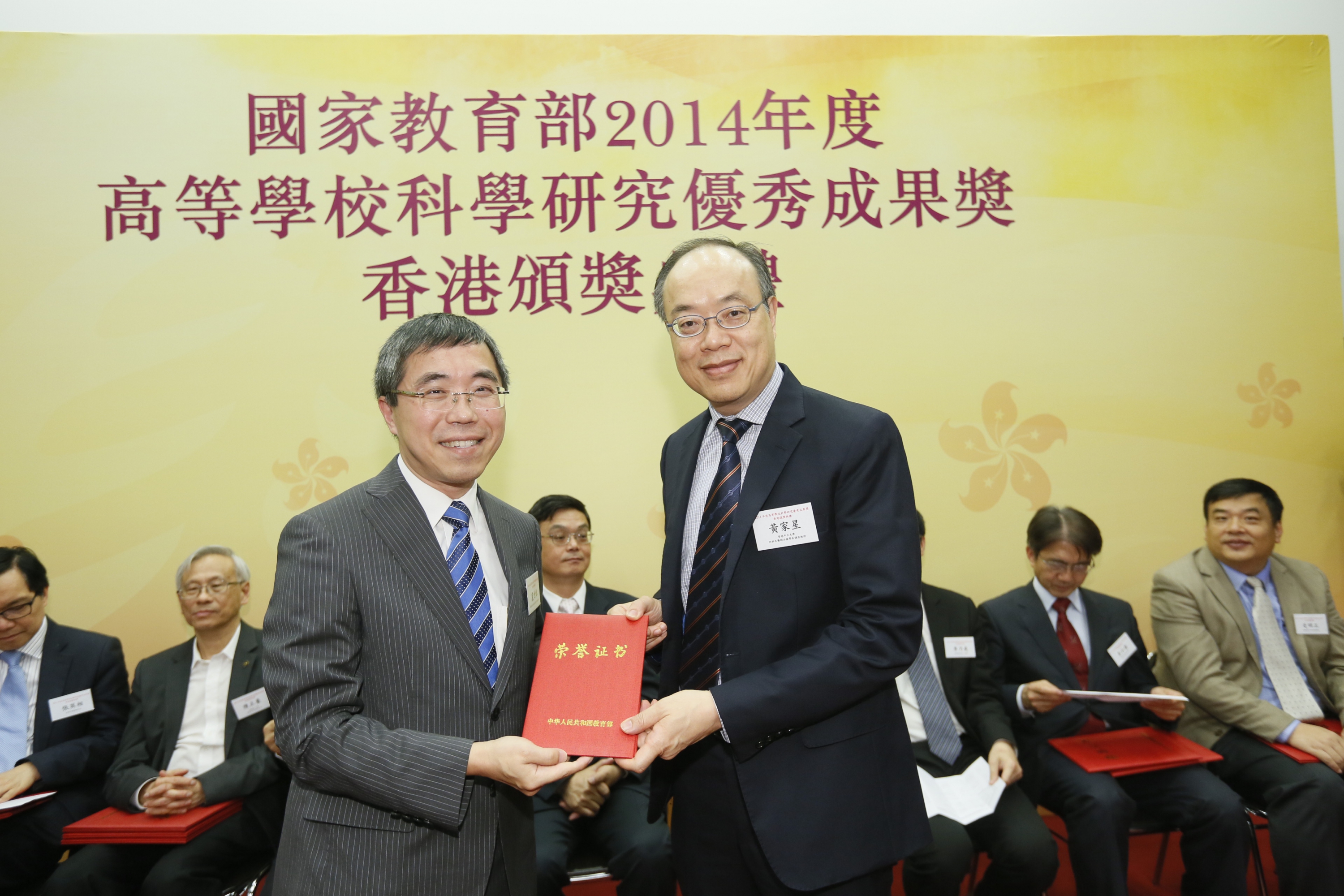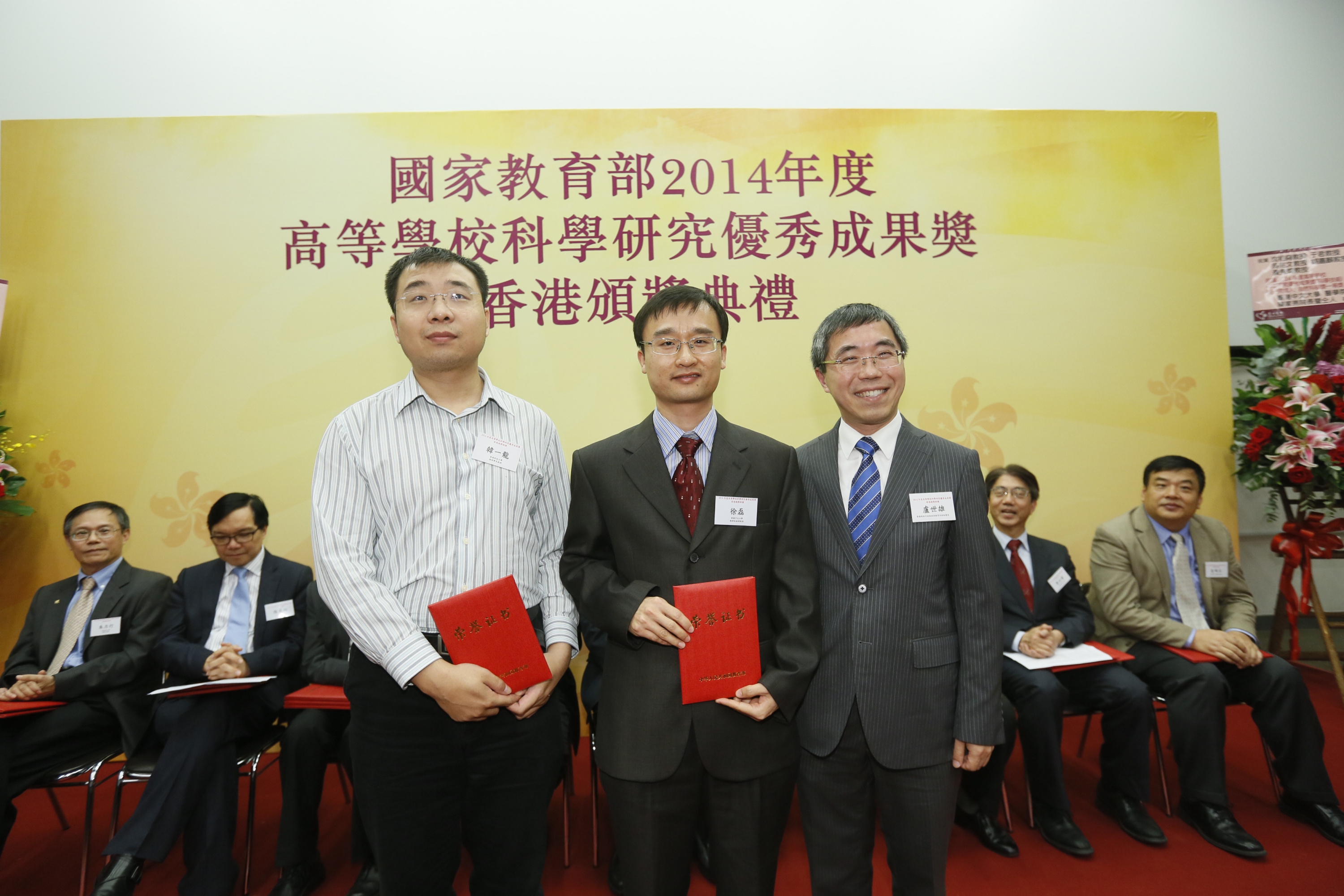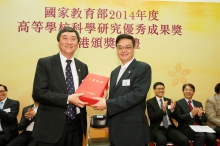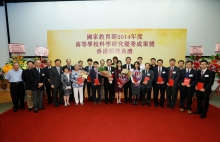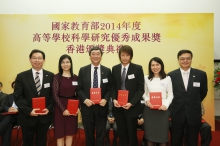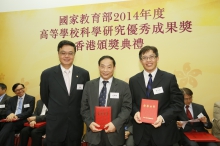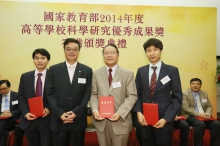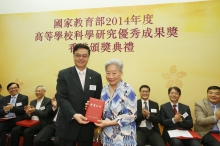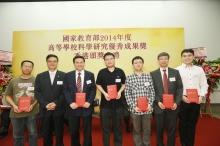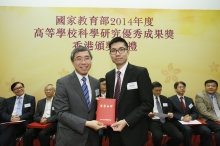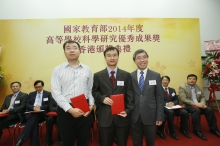CUHK
News Centre
CUHK Received Eight Ministry of Education Higher Education Outstanding Scientific Research Output AwardsThe Highest Share among Hong Kong Institutions
The Chinese University of Hong Kong (CUHK) received eight Higher Education Outstanding Scientific Research Output Awards (Science and Technology) from the Ministry of Education (MoE) in 2014, including two first-class awards and five second-class awards in Natural Sciences, as well as one first-class award in Scientific and Technological Progress, again making it the institution receiving the highest number of awards in the local tertiary sector. The award presentation ceremony was held today (7 May) at Yasumoto International Academic Park, CUHK. Prof. Lu Li, Director General of the Education, Science & Technology Department of the Liaison Office of the Central People’s Government in HKSAR; Mr. Brian Sai-hung Lo, Deputy Secretary for Education, HKSAR Government; and Mr. Naiyiu Li, President of Beijing-Hong Kong Academic Exchange Center, presented the prizes at the ceremony.
This is the fourth time Prof. Joseph Sung, CUHK Vice-Chancellor, and his research teams have been recognized by MoE in the past five years. He received a first-class award in natural sciences and a first-class award in technology advancement jointly with Prof. Jun Yu in 2010 and 2012 respectively, as well as a second-class award in technology advancement jointly with Prof. Francis Chan, Prof. James Lau and Prof. Philip Chiu in 2011.
Here is a summary of CUHK award-winning projects this year:
First-class award in Natural Sciences
- Prof. Joseph J.Y. Sung, Vice-Chancellor and Mok Hing Yiu Professor of Medicine; Prof. Jun Yu, Professor, Department of Medicine and Therapeutics; Prof. Simon Siu-man Ng, Professor, Department of Surgery; Prof. Ka-kei Wu, Assistant Professor, Department of Anaesthesia and Intensive Care; and Prof. Siew-chien Ng, Associate Professor, Department of Medicine and Therapeutics — Integrative research on molecular basis and potential diagnostic and therapeutic targets for colorectal cancer
Colorectal cancer (CRC) is one of the most common cancers worldwide. Its incidence has been increasing in many Asian countries, and is now the second most common cancer in China. During the past 10 years, the CUHK research team conducted integrative and in-depth research on this disease. Research has been focused on dysregulation of cellular signaling pathways (e.g. epigenetics and microRNAs) in colon tumorigenesis, genome-wide sequencing analysis for depicting the molecular landscape of Asian CRC, identification of novel biomarkers for non-invasive diagnosis, and formulation of practice guidelines for CRC screening in Asian countries. Findings from these studies have led to a total of 181 research articles published in peer-reviewed journals, including Lancet Oncology, Gastroenterology, Gut and Cell Research and citations over 4,600 times.
- Prof. Gang Li, Professor, Department of Orthopaedics and Traumatology — Vascularized and innervated tissue-engineered bone: its construction and bone mechanisms
Bone defect is a lack of bone tissue in a body area, usually caused by trauma, infection or tumor removal. Tissue-engineered bone has been viewed as a potential alternative repair method to the conventional use of bone grafts due to less transplant rejection and disease transmission. However, necrosis may occur within the core of large tissue-engineered bone due to ischemia. In cooperation with the Forth Military Medical University, Shanghai Jiao Tong University School of Medicine and Southern Medical University, Prof. Li Gang successfully engineered the vascularized bone, which promotes bone formation in larger animals such as primates. The research team proved for the first time that implanting vascular bundles and sensory nerves promotes bone formation and innervation. Based on the findings, the team has established standard operation procedures for tissue-engineered bone construction, and provided practical guidance for clinical trial as well as applications.
Second-class award in Natural Sciences
- Prof. Hui-yao Lan, Professor and Prof. Arthur Chi-kong Chung, Research Assistant Professor, Li Ka Shing Institute of Health Sciences — Mechanism of TGF-beta / Smad signaling in renal fibrosis and molecular targeted therapy
Renal fibrosis or scarring is a common pathway leading to the end-stage of kidney disease. The CUHK research team found that TGF-beta / Smad signaling is a key factor in the development of renal scarring. In view of this, the team conducted thorough researches on the scarring mechanism, proteins characteristics and their role in renal scarring, and dedicated themselves to transferring research data to clinical application, including the establishment of ultrasound microbubble – mediated Smad7 and Smad3-dependent microRNA therapy. In addition, the research revealed the role of naringenin and asiatic acid, common ingredients in Chinese medicine, in anti-fibrosis strategy. The result provides a scientific rationale for the development of Traditional Chinese Medicine.
- Prof. Hui Lin, Director, Institute of Space and Earth Information Science, and two research associates Dr. Min Chen and Dr. Mingyuan Hu — Studies on virtual geographic environments for geographic experiments: theory and methods
For a long time, geographic experiments have played a vital role in solving geographic problems and promoting the development of geography. In this context, the research team led by Prof. Hui Lin, partnered with Nanjing Normal University, the Institute of Remote Sensing and Digital Earth of the Chinese Academy of Sciences, the PLA Information Engineering University, Southwest Jiaotong University and the Academy of Armored Forces Engineering of PLA (all researchers are either former students of Professor Lin or his former CUHK team members), originally proposed to construct the virtual geographic environment (VGEs) which is corresponding to the physical world and integrates geo-data, geo-process models, geo-collaborative analysis and virtual environment simulation. This novel geographic experimental method with ‘virtuality and reality combination’ enables multidimensional, multi-scale geographic experiment and helps improve the effect of the experimental geography. Dr. Roger Tomlinson, father of GIS, said VGEs ‘has made impressive progress in geographic information science itself’. At the same time, the national natural science foundation takes ‘virtual geographic environment and augmented reality’ as a new direction of funding.
- Prof. Tony Shu-kam Mok, Li Shu Fan Professor of Clinical Oncology — Personalized medicine for lung cancer
Lung cancer is the most common fatal malignancy in the world. Most patients with lung cancer are at an advanced stage at the time of diagnosis, thus leading to short survival. A novel development that adopts a personalized approach according to patient’s genomic status has greatly improved treatment outcome in the past decade. Multi-national studies led by Prof. Tony Mok helped establish personalized medicine for lung cancer. In particular, the IPASS study conducted in 2009 was the first that confirmed the superiority of molecular targeted therapy, namely gefitinib, over standard chemotherapy in patients with EGFR mutations. Professor Mok also revealed the role of first-line crizotinib, an anti-cancer drug, for patients with ALK positive lung cancer in 2014. Both landmark studies were published in New England Journal of Medicine and have been cited over 2,000 times. The studies establish a new standard practice of testing EGFR and ALK mutation status for all lung cancer patients and selecting suitable therapy according to results.
- Prof. Jianbin Xu, Professor; Prof. Hon-ki Tsang, Chairman; Dr. Kun Chen, Dr. Zhenzhou Cheng and Dr. Xi Wan, Post-doctoral Fellows; as well as former PhD students Dr. Xiaomao Wang and Dr. Xiao-qing Tian, Department of Electronic Engineering — Interface engineering for graphene transistors and photodetectors
Graphene is an atomically-thin 2-dimensional layered material of carbon with exceptionally superior electronic, optical, mechanical, thermal, as well as chemical properties. A collaborative research project led by Prof. Jian-Bin Xu and a partner from Jinan University (Guangzhou) has successfully yielded a new device with graphene for detecting light in the mid-infrared (mid-IR) spectral region. This groundbreaking work is expected to enable a new generation of high efficiency, low cost, and highly integrated mid-IR detectors, paving the way for applications of mid-IR spectroscopy in environmental and biomedical engineering. Moreover, the team has developed a new synthesis route for producing high-quality large-area graphene from polycyclic aromatic hydrocarbons, which is a unique synthetic approach. The key techniques involved in graphene synthesis, transfer and interface can be further applied to other 2-dimensional layered materials for achieving novel electronic and photoelectric devices.
- Prof. Lei Xu, Assistant Professor, Department of Physics — Rich phenomena and interesting physics in complex systems Complex systems is an important scientific field covering a wide range of system parameters, such as the telecommunication network, the transport network, human neural system, or even the entire human society. Prof. Lei Xu has collaborated with research groups from Fudan University and Hong Kong University of Science and Technology to explore the complex interactions among individual members and how their response to external excitations induces collective behaviors for the entire system. In particular, Professor Xu’s group has focused on the colloidal and emulsion systems, which are suspensions of micron-sized particles and droplets in another fluid. The research results revealed a novel oscillatory coalescence process; as well as illustrated the long-time puzzle of the low-frequency quasi-localization of vibrational modes in disordered colloidal systems. These studies may find broad applications in important fields such as oil recovery, drug delivery, glass transition and jamming phenomena.
First-class award in Scientific and Technological Progress
- Prof. Lawrence Ka-sing Wong, Head of Division of Neurology, Department of Medicine and Therapeutics, and Mok Hing Yiu Professor of Medicine — The advanced strategy of risk assessment, prevention and therapy for ischemic cerebrovascular diseases Ischemic stroke is one the leading causes for adult disability in China, with high risk of subsequent recurrence. In the last 19 years, Prof. Lawrence Wong and the research team from Capital Medical University jointly conducted in-depth research into the epidemiology, prognosis, risk stratification and optimization of treatment strategy for ischemic stroke in the Chinese population. The research team was the first to verify the safety and efficacy of short-term dual antiplatelet therapy of aspirin plus clopidogrel, initiated within 24 hours of symptom onset, in treating high-risk minor ischemic stroke or transient ischemic attack patients. A total of 81 research articles have been published by the research team on SCI-indexed, peer-reviewed journals, including top-tier journals such as New England Journal of Medicine and Circulation, and the research findings have been quoted in the up-to-date practice guideline on secondary prevention of ischemic stroke by the American Heart Association/ American Stroke Association.
About Higher Education Outstanding Scientific Research Output Awards
The Higher Education Outstanding Scientific Research Output Awards (Science and Technology) is set up by the MoE to recognize outstanding research projects at all tertiary institutions in mainland China. Since 2009, Hong Kong’s tertiary institutions have been included in the scheme. The award is presented to individuals or units who have made remarkable contributions in the areas of scientific discovery, technological innovation, science and technology advancement and implementation of patented technologies. The Natural Sciences Award honours researchers who have made discoveries in natural science and applied science, or given explanations to natural phenomena and characteristics; the Technology Advancement Award honours research achievements in applied technologies of natural science.
CUHK receives 8 Higher Education Outstanding Scientific Research Output Awards (Science and Technology) from MoE in 2014. Prof. Joseph Sung, Vice-Chancellor of CUHK (left), represents the University to receive the award certificates from Prof. Lu Li, Director General of the Education, Science & Technology Department of the Liaison Office of the Central People's Government in HKSAR.
Prof. Joseph Sung (3rd left) and his research team receive their award certificates from Prof. Lu Li (right).
Prof. Hui-yao Lan (middle) and Prof. Arthur Chung (right) receive their award certificates from Prof. Lu Li.
Prof. Hui Lin (2nd right) and his research team receive their award certificates from Prof. Lu Li (2nd left).
Prof. Tony Mok’s mother (right) represents his son to receive the award certificate from Prof. Lu Li.
Prof. Jianbin Xu (3rd left) and his research team receive their award certificates from Prof. Lu Li (2nd left).
Prof. Yuk-wai Lee (right) represents Prof. Gang Li to receive the award certificate from Mr. Brian Lo, Deputy Secretary for Education, HKSAR Government.


